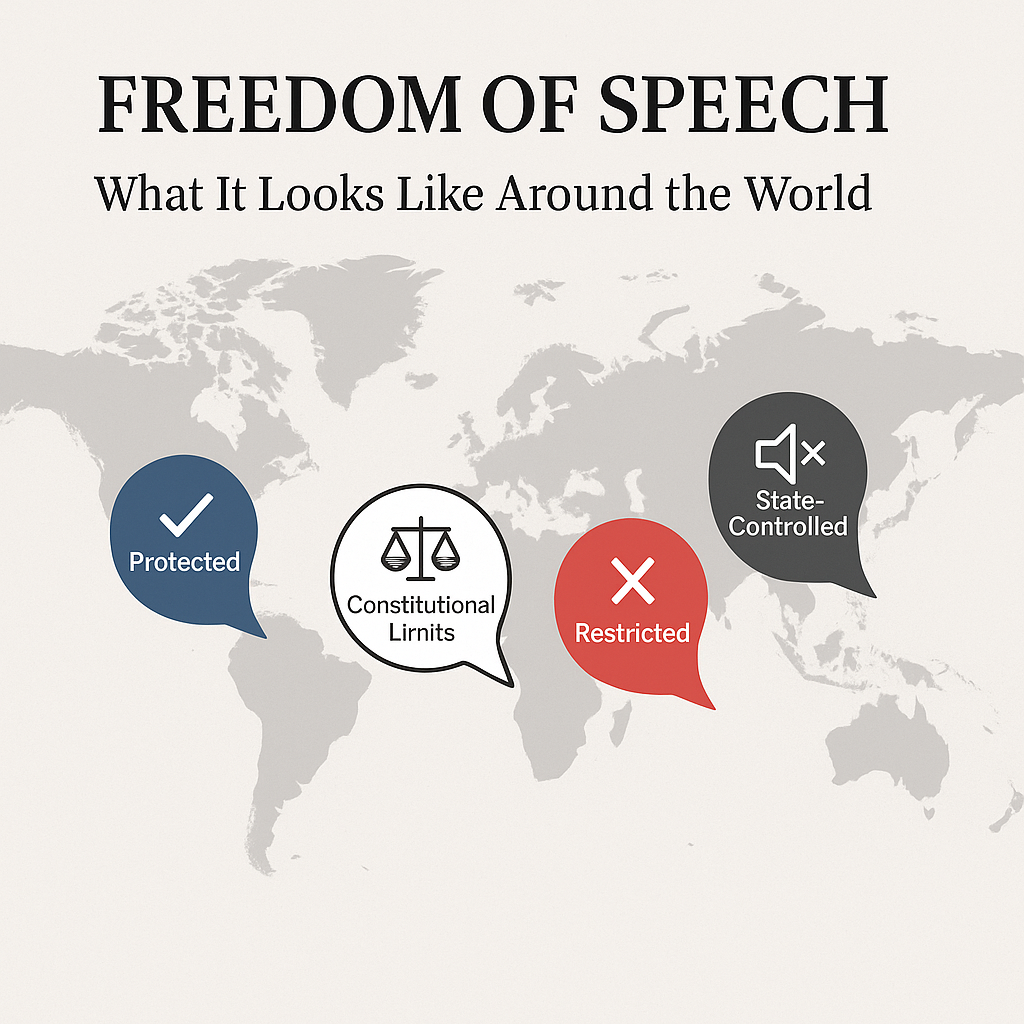Freedom of speech is widely considered a cornerstone of democracy — yet how it’s defined and protected varies greatly depending on where you live. Some countries enshrine it strongly in their constitutions, while others place strict limits on what can be said publicly, especially when it comes to criticizing government or religion.
Let’s explore how freedom of speech laws compare across a few key regions:
🇺🇸 United States
- Legal Framework: Protected under the First Amendment of the U.S. Constitution.
- Scope: Broad — includes political speech, symbolic acts (like flag burning), hate speech (as long as it doesn’t incite violence).
- Limitations: Very few — exceptions include incitement to violence, threats, defamation, and obscene content.
- Notable Fact: The U.S. has some of the strongest protections for speech globally, even allowing controversial or offensive speech under the law.
🇬🇧 United Kingdom
- Legal Framework: No single constitutional document; protections come from common law, the Human Rights Act 1998, and Article 10 of the European Convention on Human Rights (ECHR).
- Scope: Protected but subject to limitations “necessary in a democratic society.”
- Limitations: Includes national security, public order, protection of health or morals, and defamation laws.
- Notable Fact: UK law criminalizes hate speech, and public order laws can restrict protests or offensive speech in public.
🇮🇳 India
- Legal Framework: Article 19(1)(a) of the Indian Constitution guarantees freedom of speech and expression.
- Scope: Recognized as a fundamental right, but heavily qualified.
- Limitations: Restrictions include the sovereignty and integrity of India, decency, morality, contempt of court, defamation, and incitement to an offense (Article 19(2)).
- Notable Fact: Laws like Section 124A (sedition) and IT Act Section 66A (now struck down but still misused) have raised concerns over misuse.
🇨🇳 China
- Legal Framework: Guaranteed under Article 35 of the Constitution, but heavily restricted in practice.
- Scope: Government retains broad control over speech, media, and online platforms.
- Limitations: Speech critical of the state, Communist Party, or national unity is punishable.
- Notable Fact: China ranks very low in global press freedom indexes and enforces strong internet censorship (the “Great Firewall”).
🇩🇪 Germany
- Legal Framework: Article 5 of the German Basic Law (Grundgesetz) guarantees freedom of expression.
- Scope: Protected, but balanced against personal dignity and public safety.
- Limitations: Includes Holocaust denial, incitement of hatred, Nazi symbols, and hate speech.
- Notable Fact: Germany’s approach reflects a historical context, especially due to its past with Nazi propaganda.
🌐 Key Observations
- Universal vs Conditional: Many countries recognize freedom of speech as a right, but most add conditions and exceptions — especially around national security and hate speech.
- Cultural & Historical Contexts Matter: Laws often reflect a country’s history with authoritarianism, violence, or colonialism.
- Internet Expression: Social media and digital platforms have become new battlegrounds, with laws often lagging behind technology.
📊 Conclusion
Freedom of speech is not a one-size-fits-all right. While countries like the U.S. uphold it with near-total protection, others like Germany or the UK take a more balanced approach, especially when speech may harm social harmony. In countries like China, it exists more as a theoretical right than a practiced one.
Understanding these differences is key — not just legally, but culturally. Law doesn’t only reflect what’s allowed. It reflects what a society is willing to protect, and what it fears.
